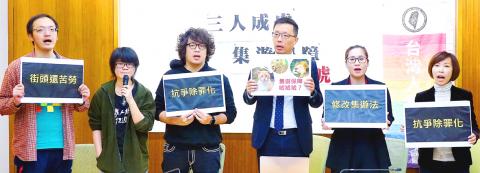Civic groups and legal experts yesterday decried proposals for stricter crowd control measures to deter public disturbances and street fighting, following a number of incidents that led to Premier Su Tseng-chang (蘇貞昌) calling on police chiefs to crack down and maintain public safety.
Taiwan Association for Human Rights chairman Geoffrey Weng (翁國彥) told a news conference that he is concerned by a Criminal Investigation Bureau proposal to amend provisions of the Criminal Code and other laws to allow police to take action against public gatherings of three or more people deemed as threatening violence or public order.
The proposal seeks to amend Articles 149 and 150 of the Assembly and Parade Act (集會遊行法) to make it easier for police to deal with gatherings involving violence or threats, including reducing a requirement from three to two warnings to disperse before police are allowed to arrest participants, he said.

Photo: Chu Pei-hsiung, Taipei Times
The proposal has been sent to the Ministry of Justice and the Executive Yuan, just days after Su demanded tougher action by police chiefs following brawls outside nightclubs and other entertainment venues in major cities that resulted in numerous injuries.
New Power Party Legislator Kawlo Iyun Pacidal joined the groups at the news conference to voice her opposition to the proposed amendments.
“If the amendments are passed, any gathering by at least three people in the street could be deemed as ‘open assembly with intent to commit violence or threats,’ which the police could break up and make arrests, leading to indictments and prosecution,” she said.
That would be a gross violation of people’s rights to peaceful assembly and to dissent against unjust government policies, she added.
The proposal specifying “three or more people” would leave too much gray area for authorities to wield their power against civic groups protesting public issues and runs counter to Taiwanese society’s cherished values of democracy, freedom and human rights, Kawlo said.
Deputy Minister of the Interior Chen Tsung-yen (陳宗彥) said that the amendments would only deal with disturbances at nightclubs and “special entertainment venues,” and are intended to combat criminal behavior.
Authorities would not engage in actions described by human rights groups as abuse or that affect the rights of citizens to stage rallies, Chen said.
Officials said that the legal basis for the proposal comes from the Organized Crime Prevention Act (組織犯罪防制條例), Article 2 of which refers to “criminal organizations” as “structured, permanent or profit-seeking organizations formed by three or more persons involved in threats, violence, fraud, intimidation or other offenses.”

Taiwanese can file complaints with the Tourism Administration to report travel agencies if their activities caused termination of a person’s citizenship, Mainland Affairs Council Minister Chiu Chui-cheng (邱垂正) said yesterday, after a podcaster highlighted a case in which a person’s citizenship was canceled for receiving a single-use Chinese passport to enter Russia. The council is aware of incidents in which people who signed up through Chinese travel agencies for tours of Russia were told they could obtain Russian visas and fast-track border clearance, Chiu told reporters on the sidelines of an event in Taipei. However, the travel agencies actually applied

Japanese footwear brand Onitsuka Tiger today issued a public apology and said it has suspended an employee amid allegations that the staff member discriminated against a Vietnamese customer at its Taipei 101 store. Posting on the social media platform Threads yesterday, a user said that an employee at the store said that “those shoes are very expensive” when her friend, who is a migrant worker from Vietnam, asked for assistance. The employee then ignored her until she asked again, to which she replied: "We don't have a size 37." The post had amassed nearly 26,000 likes and 916 comments as of this

New measures aimed at making Taiwan more attractive to foreign professionals came into effect this month, the National Development Council said yesterday. Among the changes, international students at Taiwanese universities would be able to work in Taiwan without a work permit in the two years after they graduate, explainer materials provided by the council said. In addition, foreign nationals who graduated from one of the world’s top 200 universities within the past five years can also apply for a two-year open work permit. Previously, those graduates would have needed to apply for a work permit using point-based criteria or have a Taiwanese company

The Shilin District Prosecutors’ Office yesterday indicted two Taiwanese and issued a wanted notice for Pete Liu (劉作虎), founder of Shenzhen-based smartphone manufacturer OnePlus Technology Co (萬普拉斯科技), for allegedly contravening the Act Governing Relations Between the People of the Taiwan Area and the Mainland Area (臺灣地區與大陸地區人民關係條例) by poaching 70 engineers in Taiwan. Liu allegedly traveled to Taiwan at the end of 2014 and met with a Taiwanese man surnamed Lin (林) to discuss establishing a mobile software research and development (R&D) team in Taiwan, prosecutors said. Without approval from the government, Lin, following Liu’s instructions, recruited more than 70 software